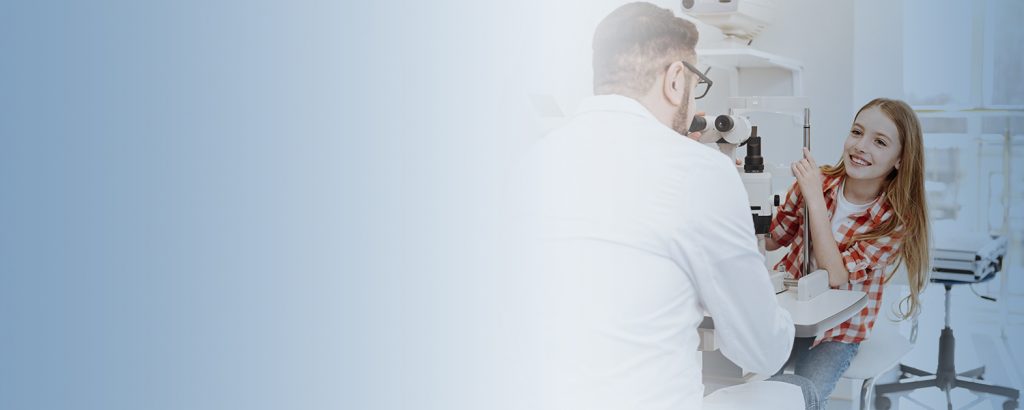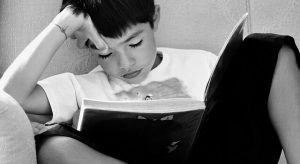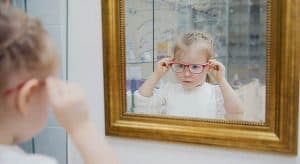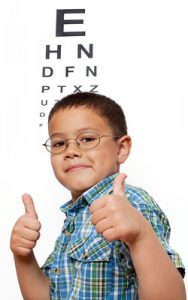Vision screenings do not tell the whole story. Your child may ‘pass’ a school vision screening, but still have an undiagnosed vision problem.
Many people don’t realize that vision screenings at school are not the same as the comprehensive eye exam a child receives when at the local eye care clinic.
Vision screenings do not replace a comprehensive eye exam.
Eye exams are still required, no matter the results of a school vision screening.
So, what’s the difference, and why does one not replace the other?
Vision screenings
Vision screenings are a useful tool for simple-to-detect issues like myopia (nearsightedness) or severe amblyopia, but not nearly as thorough as a comprehensive eye exam.
Most school-based vision screenings do not detect the majority of vision problems that can make it harder for children to learn in school.
Today, learning relies heavily on students having both clear eyesight and strong vision skills needed to successfully use computers, read and comprehend texts, do their homework promptly and accurately and perform on exams, among many other essential tasks.
Issues with vision screenings
Here’s an outline of some of the main shortcomings of a common vision screening:
1 Poor testing environment
Vision screenings are often done in rooms that do not have the right lighting for testing, with limited equipment that may not have been maintained properly.
Testing may also be done at non-standardized distances (i.e. too close or too far away). A poorly controlled testing environment can cause results to be unreliable.
2. Limited equipment
One of the main tools of vision screenings is the Snellen vision chart. This chart was invented 150 years ago, and only assesses a person’s distance vision, to see if they have 20/20 sight.
The chart does not assess the type of near vision acuity that a child needs for tasks such as reading and writing.
Visual skills such as focusing, eye tracking and eye teaming, which are essential for many school activities, also are not assessed with a Snellen chart, and there is no ability to ascertain a child’s overall ocular health using this chart.
3. Training of the testers
Most of the time, the people doing these vision screenings are not trained eye care professionals. They may be school nurses or teachers or are volunteers from the community, or personnel from the school.
Only eye care professionals have the expertise to properly and reliably conduct these screenings tests and then assess the results with accuracy.
In most vision screening, the individuals who carry out school vision screenings lack the technology and equipment to identify visual skills deficits that can impact a child’s school grades.
SEE RELATED: Does Hyperopia Impact Learning?
Even if your child ‘passes’ their school vision screening, schedule a comprehensive eye exam with an eye doctor near you.
Comprehensive eye exams
According to the College of Vision Development (COVD), an estimated 25 percent of all children in the United States have vision problems.
Many of these vision problems will go undetected in a school vision screening.
In contrast to vision screenings, comprehensive eye exams are performed by optometrists with specialized clinical tools and assessments to obtain a thorough picture of a child’s overall eye health, vision and visual skills.
Some tests that are performed during a comprehensive eye exam to check your child’s eye health include:
A child’s comprehensive eye exam usually includes assessment of:
- Visual acuity
- Lazy eye
- Eye turns
- 3D vision
- Eye tracking
- Convergence
- Color vision
- Ocular health
All of these above are vitally important to give your child the best platform to reach their potential at school.
If your child has passed a vision screening, but still not achieving their potential at school, schedule an eye exam with an eye doctor near you.
Visual skills
Visual skills may be lacking even if your child’s eyes are perfectly healthy and they passed a school vision screening with 20/20 vision.
Besides the visual acuity test of 20/20 vision, an eye doctor may also asses the visual skills to rule out the presence of:
- Convergence insufficiency
- Focusing difficulties
- Poor depth perception
- Visual processing issues
Along with these and other tests to ensure your child’s eyes are healthy and developing properly, a comprehensive eye exam will also evaluate the important vision skills your child needs for success in school and beyond.
Annual eye exams for children
Eye care professionals recommend that children have a comprehensive eye exam every year, even before they reach school age.
These eye exams facilitate early detection and treatment of vision problems, and help to ensure that your child’s eyes and vision are developing properly.
LEARN MORE: Vision for School
If you have any concerns about your child’s academic performance, schedule a comprehensive eye exam with an eye doctor near you.
Vision screenings can miss key details of your child’s ocular and visual health.
Regular comprehensive eye exams are the best way to ensure that your child’s eyes are healthy and their vision is clear and comfortable.









